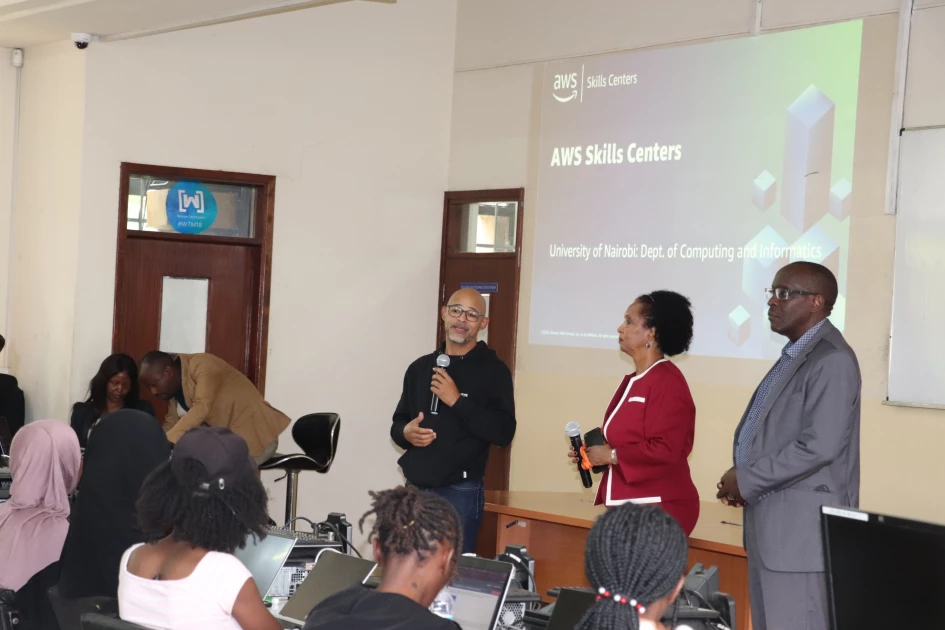Closing Africa’s Digital Divide: AWS empowers young Kenyans with cloud expertise

AWS trainer Nigel Solomons addresses computer science students at the University of Nairobi at the culmination of a three-day training program at the Department of Computing and Informatics. Photo/ Pool
Amazon Web Services (AWS) has completed a three-day cloud computing training at the University of Nairobi, part of its broader push to equip Africa’s next generation of technology professionals with essential digital skills.
The initiative, held under the AWS Skills Center program, seeks to
bridge Africa’s growing technology skills gap and prepare young professionals
for careers in cloud computing, artificial intelligence (AI), and big data.
The training brought together 125 computer science students, offering hands-on instruction in foundational cloud concepts and industry-recognized certifications.
Through its collaboration with the university, AWS hopes to
make its Skills Center curriculum more accessible to Kenyan students, ensuring
a pipeline of skilled professionals capable of meeting the region’s demand for
cloud expertise.
AWS launched its first Skills Center outside the United States in South
Africa in 2023, aiming to lower barriers to cloud education for individuals
without technical backgrounds. The Cape Town centre offers both in-person and
virtual training, enabling students across Africa—including those in Kenya who
missed the Nairobi event—to participate in live, instructor-led sessions.
Why Digital Skills Matter in Africa
As cloud adoption accelerates across Africa, AWS is positioning itself
as a key player in training a workforce ready for the continent’s digital
economy. The AWS-UoN community classroom is part of a larger strategy to ensure
Africa’s technology ecosystem keeps pace with global advancements.
The Nairobi training included six instructor-led courses, covering
fundamental cloud computing principles and the "Becoming a Cloud
Practitioner" series—an entry-level program designed for individuals
without prior IT experience. These sessions cater not only to students
transitioning into cloud careers but also to professionals seeking cloud
literacy for business applications.
“We are thrilled to have collaborated with the University of Nairobi to
bring in-person AWS instructor-led training to Kenyan students,” said Nondumiso
Zibi, AWS Director for Support Engineering, EMEA. “Cloud computing is at the
core of digital transformation, and we believe access to high-quality training
is essential to unlocking career opportunities. This initiative aligns with our
long-term commitment to equipping young people with the necessary technical
skills to thrive in the current global job market.”
The University of Nairobi hailed the collaboration as a crucial step in
ensuring students are industry-ready upon graduation.
“The future of work is digital, and our work with AWS ensures that our
students gain practical, industry-relevant skills,” said Professor Andrew
Kahonge, Chair of the Department of Computing and Informatics at UoN. “We
recognize the increasing demand for cloud expertise and are committed to
equipping our students with the knowledge and certifications that will give
them a competitive edge in the job market.”
Prof. Leonidah Kerubo, Dean of the Department of Computing and
Informatics at UoN, emphasized the importance of imparting practical skills to
students as they prepare for the future of work. “We want our students to be
market-ready. That’s why we are working very closely with industry players like
AWS so they can fit with the current tech industry requirements,” she said.
“AWS coming to show us how to close the skills gap is very important, and
that’s why we appreciate them.”
Students gained exceptional
skills
The training drew a diverse group of students eager to jumpstart their
careers in technology. Many participants said the hands-on learning and
real-world applications discussed during the sessions gave them a deeper
understanding of cloud computing and its potential.
Cecilia K’Owiti, a second-year computer science student, described the training
as a transformative experience. “Before this program, I had a rough
understanding of how cloud computing works, but now I see its actual areas of
application and the career paths it can open for me.”
For Neville Mwangangi, a fourth-year computer science student, the
sessions were eye-opening. “Our instructor, Nigel Solomons, was great. He broke
down complex core elements of cloud infrastructure into simple explanations. My
idea of the cloud was mostly about storage, but I now understand it as a service.”
Terry Mukundi, a fourth-year computing student, said the training
provided invaluable practical skills. “I knew about cloud computing but only in
theory. This training helped me understand how to optimize the cloud for
deploying workflows, and I’m now more confident in using AWS cloud services,
especially for my final-year project.”
AWS encouraged students who completed the training to pursue their AWS
Certified Cloud Practitioner certification and continue learning through AWS
Educate, which provides free self-paced courses and hands-on labs.
The Cloud as an
Enabler of Africa’s Digital Economy
According to the PwC Africa Cloud Business Survey 2023, half of African
companies have already adopted cloud capabilities in all or most parts of their
business. That number is expected to rise to 61% within the next two years,
signaling a significant shift towards cloud-based solutions.
For startups and small businesses, cloud services level the playing
field, allowing them to utilize enterprise-grade technologies that were once
only accessible to large corporations. This democratization of IT resources is
fueling innovation across sectors such as fintech, e-commerce, and health tech.
A 2024 report from McKinsey Global Institute projects that the global
value of cloud computing could reach $3 trillion, with Africa and Europe
combined standing to capture $797 billion of that total.
“Almost a fifth of African companies have all workloads in some sort of
cloud environment, with most relying on public cloud services,” the report
states. “Cloud expenditure across organizations accounts for an average of 38%
of total IT spending, compared to a projected global cloud spend of about 50%
of IT expenditure by 2025.”
Despite this growth, Africa faces a widening digital skills gap. A 2022
report by the International Finance Corporation (IFC) estimates that over 230
million jobs in sub-Saharan Africa will require digital skills by 2030. Yet,
access to specialized training remains limited, leaving many young people
unprepared for the digital economy.
Cloud computing is not just about storage—it is a foundational
technology that enables businesses to scale efficiently, reduce costs, and
support innovation. Without a skilled workforce, African businesses risk
operational inefficiencies and increased reliance on foreign expertise,
limiting local job creation and economic empowerment.
AWS’s investment in cloud training aligns with Kenya’s ambition to position itself as a global technology hub. Nairobi, often referred to as the “Silicon Savannah”, has attracted major tech companies and startups, but the success of its digital economy hinges on a steady supply of cloud professionals.
Want to send us a story? SMS to 25170 or WhatsApp 0743570000 or Submit on Citizen Digital or email wananchi@royalmedia.co.ke
Comments
No comments yet.



Leave a Comment